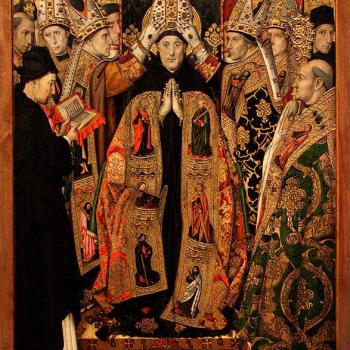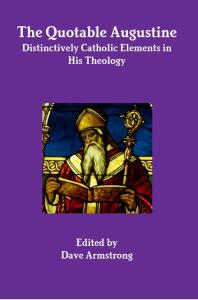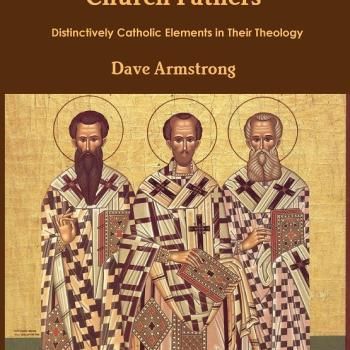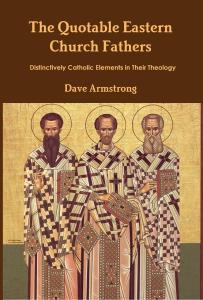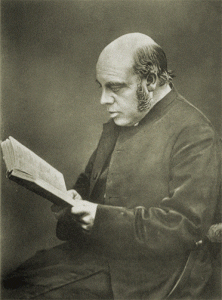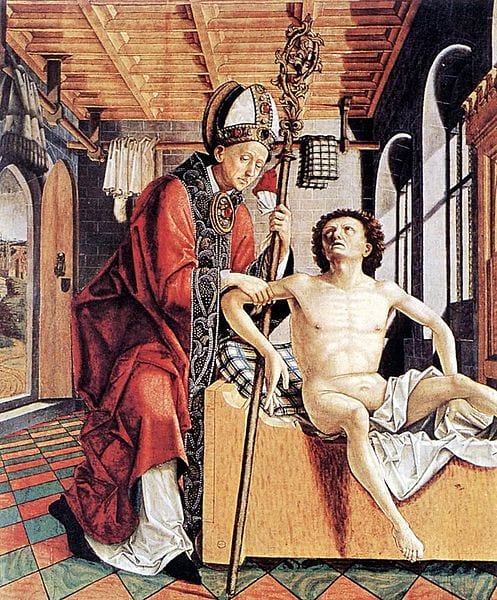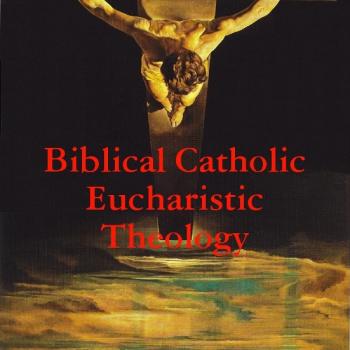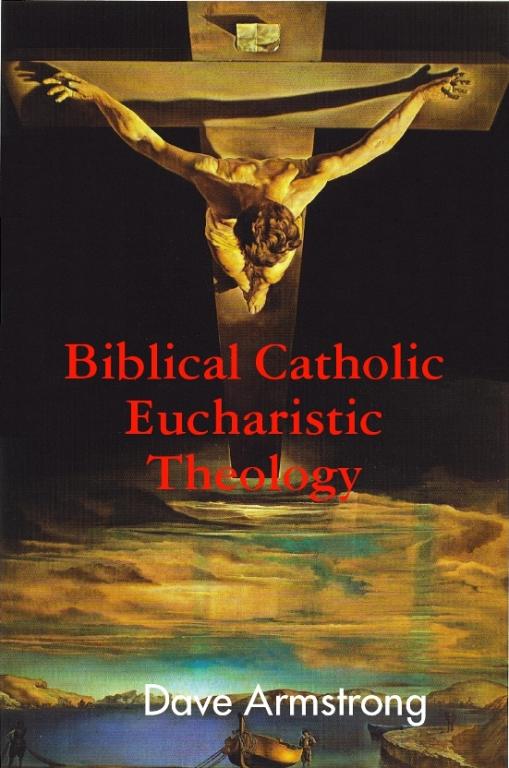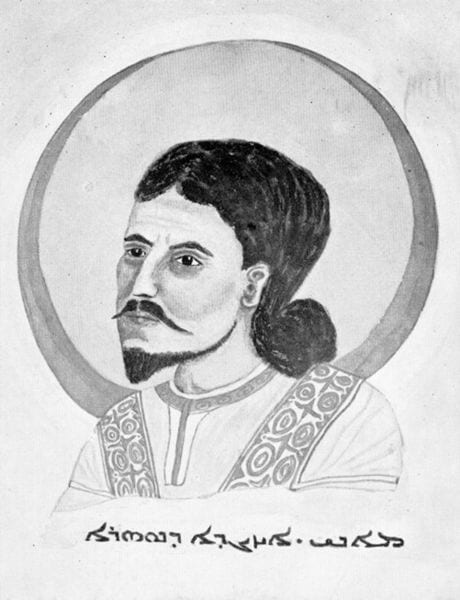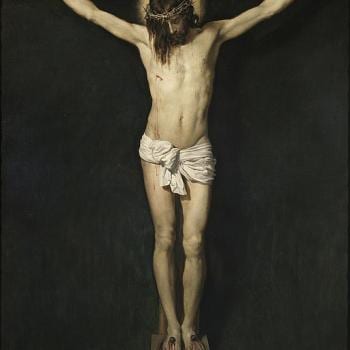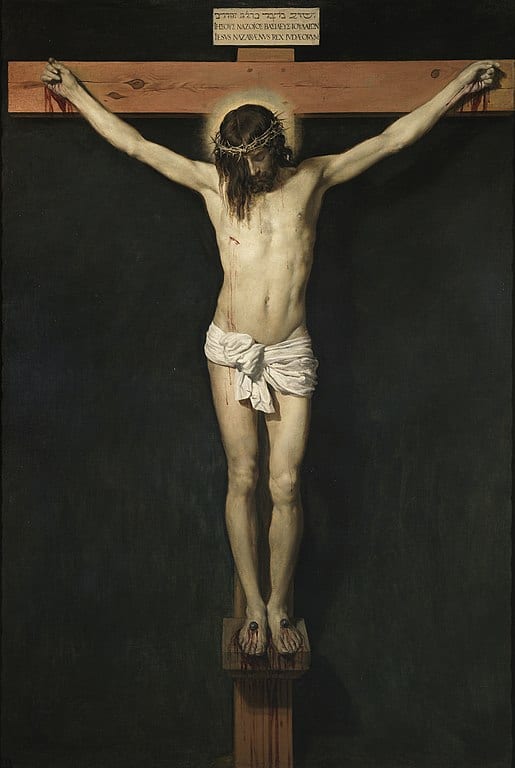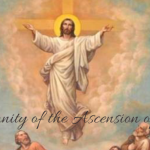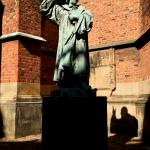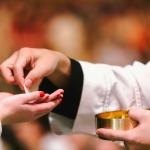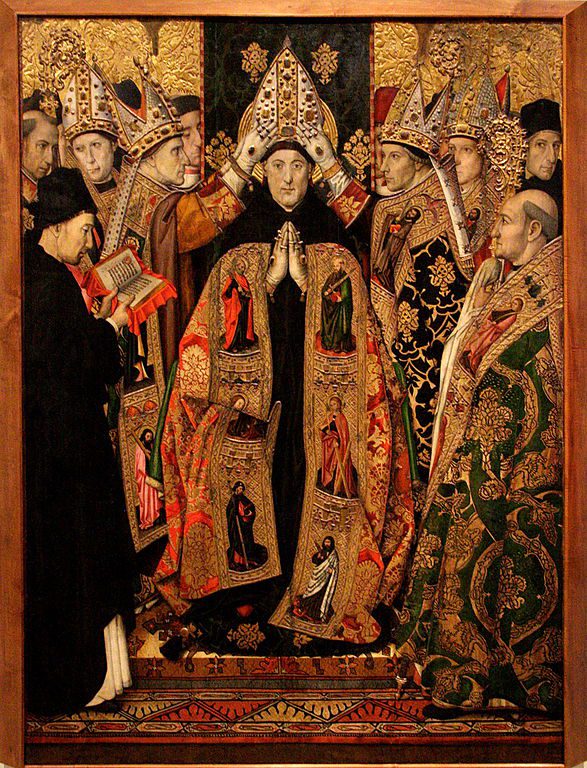
***
***
This came about as a result of a vocal Protestant at the Catholic Answers forum (in the thread: “SPLIT: The Real Presence”). Randy Carson, a Catholic regular there, cited several of my papers, and then informed me of the thread. I then posted (through him) material from my older papers, and add now some largely new observations, since I’ve been challenged and the (almost inevitable) charge was made (by “Sola Scriptura“) that I cited Protestant historians J. N. D. Kelly and Philip Schaff out of context:
I tried to make it clear in that post that Augustine believed in a “real presence” and not just that the Lord’s Supper was symbolic. So there is your both/and, however it is equally true that Augustine did not believe the bread was changed into the body of Christ, that is a physical presence of Christ’s body was present on earth during the Supper. Kelly is right on the money. Augustine use of sacramental language is the same as biblical use of sacramental language. The Scriptures calls the cup, the blood. It calls circumcision, the covenant. It doesn’t mean these things are changed into the other, but because of the sacramental union it perfectly just to refer to the sign(i.e. visible element) to the thing signified (i.e. spiritual truth ). It is beyond debate for anyone who reads Kelly on this issue that he does not believe Augustine believed in a physical presence, because Kelly separates the ECFs into two camps. Those who believed in a spiritual real presence and those who believed in a physical real presence. He clearly puts Augustine in the category of Tertullian and others that believed in a spiritual presence.
Not only did Mr. Armstrong misuse Kelly in this way, but he did the exact same thing to Protestant Scholar Philip Schaff. Mr. Armstrong sees the word realism or real presence and assumes physical presence. However, Schaff goes on to make the same point that Kelly made.
. . . How Mr. Armstrong could even attempt to use Schaff as affirming his cause is beyond me, especially when Dr. Schaff says Augustine is closer to the Orthodox Reformed doctrine.
Earlier, I had stated, concerning this (Calvinist) challenger:
He’s just repeating himself now and spinning his wheels. St. Augustine believed in a simultaneous symbolism and realism, side-by-side, as I have explained in my papers: like the “sign of Jonah” also being real, literal, and physical: the Resurrection. It’s “both/and.” . . . Kelly (showing his natural bias a bit) stresses the symbolism part too much, over against Augustine’s realism. . . . But your opponent won’t accept that. He wants to torture all the quotes into symbolism only. It can’t be done. He won’t change his mind . . .
The problem is his “either/or” mentality. That’s why facts (even if presented by Protestant scholars — you provided nine from my materials) are ineffectual to get him to see what Augustine believed. He can’t comprehend Augustine’s dual “both/and” view because his premises don’t and won’t allow him to do so. We can accept both sides of the equation but he can only accept one, and so has to pretend the other doesn’t exist, or explain it away by special pleading. He can’t simply follow the facts of patristic beliefs to where they clearly lead. He’ll keep asking questions forever. But that doesn’t mean he has prevailed in the debate.
The following constitutes my latest complete response.
It is incorrect (to put it mildly) to say that I have provided citations improperly. Schaff and Kelly both clearly show their Protestant bias, and come down more on the side of a symbolic eucharistic belief of Augustine. Yet they acknowledge that he was (in some sense) a “realist” or “literalist” too. This is the key: they admit that he had both elements in his view. Catholics are saying that they can be harmonized: that there need not be any conflict or need to suppress one aspect at the expense of the other.
Kelly in particular, exhibits considerable confusion. I think he himself doesn’t know how to put the two strains of Augustine’s thought together. He seems to think they conflict, so he opts more for the “symbolic” aspect (as we would expect a good Protestant to do). I cite the revised 1978 edition of Early Christian Doctrines (San Francisco: HarperCollins):
-
His thought about the eucharist, unsystematic and many-sided as it is, is tantalizingly difficult to assess. (p. 446)
-
*
-
Commenting on the Psalmist’s bidding that we should adore the footstool of His feet, he pointed out that this must be the earth. But since to adore the earth would be blasphemous, he concluded that the word must mysteriously signify the flesh which Christ took from the earth and which He gave us to eat. Thus it was the eucharistic body which demanded adoration. (p. 447)
Several questions arise at this point:
-
1) If what is adored is not the “earth” (which is idolatrous), then what is adored, in St. Augustine’s view? Is it not Christ Himself?
-
*
-
2) If the latter, how is this any different from the Catholic view (in that respect)?
-
*
-
3) If St. Augustine thought adoration of the consecrated Host was proper, why does not Calvin (or even the later Luther) follow him in this?
-
*
-
4) Was St. Augustine’s example of adoration not followed because Augustine was in fact an idolater (much as Calvin accused — alongside the despised “papists” — also Luther and Lutherans of being, because they believed in the real, substantial presence)?*
-
5) If St. Augustine was an idolater because of his belief in eucharistic adoration, then why is he cited as a supposed precursor to Calvin’s mystical / spiritual eucharistic view (and supposedly more so in line with Calvin than with, say, St. Thomas Aquinas)? He should, rather, be classed as a corrupt “superstitious”, etc., etc. Catholic, in Calvin’s usual derogatory fashion.
-
*
-
6) Thus, the only reasonable, self-consistent choice seems to be that St. Augustine was much closer to the current Catholic view (in terms of Real, substantial Presence, as opposed to transubstantiation, which was more fully developed later), or else that his statements on the nature of the Eucharist, eucharistic adoration, and eucharistic sacrifice must be explained in a fashion that are contrary to received Catholic teaching.
-
*
-
7) The latter is impossible to do; therefore, Augustine must be classed as a (less-developed, but still highly-advanced for his time) Catholic, and the attempt to co-opt him as a forerunner of Calvin’s eucharistic doctrine must be abandoned by the honest historical inquirer.
St. Augustine wrote:
-
Nobody eats this flesh without previously adoring it. (Enarr. in Ps. 98, 9)
But the great historical revisionist John Calvin thought the following about those, like Augustine, who believed in adoration:
-
. . . the abominable Idolatry, when bread is pretended to assume Divinity, and raised aloft as God, and worshipped by all present! The thing is so atrocious and insulting, that without being seen it can scarcely be believed . . . A little bit of Bread, I say, is displayed, adored, and invoked. In short, it is believed to be God, a thing which even the Gentiles never believed of any of their statues! And let no one here object that it is not the Bread that is adored, but Christ who becomes substituted for the Bread the moment it has been legitimately consecrated.
-
*
-
. . . At last, behold the Idol (puny, indeed, in bodily appearance, and white in colour, but by far the foulest and most pestiferous of all Idols!) lifted up to affect the minds of the beholders with superstition. While all prostrate themselves in stupid amazement . . . What effrontery must ours be, if we deny that any one of the things delivered in Scripture against Idolatry is inapplicable to the Idolatry here detected and proved! What! is this Idol in any respect different from that which the Second Commandment of the Law forbids us to worship? But if it is not, why should the worship of it be regarded as less a sin than the worship of the Statue at Babylon? . . . how can it be lawful to keep rolling about in such a sink of pollution and sacrilege as here manifestly exists?*
-
. . . Away, then, with those who, on the view of a missal-god of wafer, bend their knees in hypocritical adoration, and allege that they sin the less because they worship an idol under the name of God! As if the Lord were not doubly mocked by that nefarious use of his Name, when, in a manner abandoning Him, men run to an idol, and he himself is represented as passing into bread, because enchanted by a kind of dull and magical murmur!
-
(On Shunning the Unlawful Rites of the Ungodly, and Preserving the Purity of the Christian Religion;1537; translated by Henry Beveridge, 1851; reprinted in Selected Works of John Calvin: Tracts and Letters, Vol. 3: Tracts, Part 3, edited by Henry Beveridge and Jules Bonnet, Grand Rapids, Michigan: Baker Book House, 1983; citations from pp. 383, 386-387, 393)
-
. . . the mere name of Sacrifice (as the priests of the Mass understand it) both utterly abolishes the cross of Christ, and overturns his sacred Supper which he consecrated as a memorial of his death. For both, as we know, is the death of Christ utterly despoiled of its glory, unless it is held to be the one only and eternal Sacrifice; and if any other Sacrifice still remains, the Supper of Christ falls at once, and is completely torn up by the roots . . .
-
*
-
Will it still be denied to me that he who listens to the Mass with a semblance of Religion, every time these acts are perpetrated, professes before men to be a partner in sacrilege, whatever his mind may inwardly declare to God?*
-
. . . Taking the single expression which gives the essence of all the invectives which the Apostle had uttered against Idolatry — that we could not at once be partakers at the table of Christ and the table of demons — who can deny its applicability to the Mass? Its altar is erected by overthrowing the Table of Christ . . . In the Mass Christ is traduced, his death is mocked, an execrable idol is substituted for God — shall we hesitate, then, to call it the table of demons? Or shall we not rather, in order justly to designate its monstrous impiety, try, if possible, to devise some new term still more expressive of detestation? Indeed, I exceedingly wonder how men, not utterly blind, can hesitate for a moment to apply the name “Table of Demons” to the Mass, seeing they plainly behold in the erection and arrangement of it the tricks, engines, and troops of devils all combined . . . I have long been maintaining on the strongest grounds that Christian men ought not even to be present at it!
-
*
-
. . . will you represent the Supper under the image of a diabolical Mass? Will you persuade us that in an act in which you ignominiously travesty the death of the Lord, you observe his Supper, in which he distinctly exhorts us to shew forth his death? (Ibid., 383, 386-388)
But Augustine thought, in contrast:
Christ is both the priest, offering Himself, and Himself the Victim. He willed that the sacramental sign of this should be the daily sacrifice of the Church. (City of God, 10, 20)
*
Not only is no one forbidden to take as food the Blood of this Sacrifice, rather, all who wish to possess life are exhorted to drink thereof. (Questions of the Hepateuch, 3, 57)
Kelly summarizes St. Augustine’s thought on the sacrifice of the mass:
-
The self-same Christ Who was slain there is in a real sense slaughtered daily by the faithful, so that the sacrifice which was offered once for all in bloody form is sacramentally renewed upon our altars with the oblation of His body and blood. (Ibid., 454; further sources: Ep. 98:9; cf. C. Faust, 20,18; 20:21)
One can’t have it both ways. The revisionist, anachronistic game must cease as the indisputable relevant historical facts are brought to light.
Jaroslav Pelikan shows the same confusion, in interpreting St. Augustine’s eucharistic doctrine:
It is incorrect, therefore, to attribute to Augustine either a scholastic doctrine of transubstantiation or a Protestant doctrine of symbolism, for he taught neither – or both – and both were able to cite his authority. (The Emergence of the Catholic Tradition (100-600) , Univ. of Chicago Press, 1971, 305; emphasis added)
Historian Philip Schaff also opts (his Protestant bias showing) for a Calvinist-like eucharistic doctrine in St. Augustine. I stated that myself in my paper of nine Protestant historians: “Schaff had just for two pages (pp. 498-500) shown how St. Augustine spoke of symbolism in the Eucharist as well . . .”
It’s true that I overlooked to some extent the less literal sense of “real presence” utilized by Protestant historians like Kelly and Schaff. Upon re-reading, I can see that. I have my natural Catholic bias, too (and would never think of denying that). But this was an innocent mistake (based on confusing differential uses of “real presence”), not a deliberate mis-citation of anyone “for polemical purposes” or any other reason. My earlier papers are now clarified in this one.
Nevertheless, in any event, Schaff’s treatment of St. Augustine’s view on the sacrifice of the Mass shows (like both Kelly’s and Pelikan’s summaries) ambiguity and is quite inconsistent with a fully “eucharistically-Calvinist” Augustine:
-
Augustine . . . on the other hand [in contrast to the memorial aspect] he calls the celebration of the communion ‘verissimum sacrificium’ of the body of Christ. The church, he says, offers (‘immolat’) to God the sacrifice of thanks in the body of Christ. [City of God, 10,20]
-
*
-
. . . The subject of the sacrifice is the body of Jesus Christ, which is as truly present on the altar of the church, as it once was on the altar of the cross, and which now offers itself to God through his priest . . . Augustine, however, connects with this, as we have already said, the true and important moral idea of the self-sacrifice of the whole redeemed church to God. (History of the Christian Church, vol.3, A.D. 311-600, rev. 5th ed., Grand Rapids, Michigan: Eerdmans, rep. 1974, orig. 1910, pp. 507-508)
Note, then, how Schaff sees very “Catholic” or substantial, “material” elements in St. Augustine’s view alongside the symbolic aspects. If any Calvinist thinks this can be harmonized with Calvin’s eucharistic theology, try to find Calvin ever speaking in terms of the “sacrificial altar” or “sacrifice of Jesus being made by the priest” and so forth. And he also states:
-
As to the adoration of the consecrated elements: This follows with logical necessity from the doctrine of transubstantiation, and is the sure touchstone of it. . . . Ambrose speaks of the flesh of Christ “which we to-day adore in the mysteries,” [Ps 98,9] and Augustine, of an adoration preceding the participation of the flesh of Christ. (Ibid., 501-502)
These patristic scholars tell us that St. Augustine taught little or nothing of the “transformationist” view (later more highly developed as transubstantiation), yet we can find a statement such as the following in the great Father’s teachings (this one to the newly-baptized):
-
What you see on the Lord’s table is, so far as external appearances go, the same as you are wont to see on your table at home. For the sight of a thing is one thing, its real meaning another . . . Up to the present it is, as you see, bread and wine. But the sanctifying words reach it and that bread will then be the Body of Christ and the wine will be His Blood. The Name of Christ, the grace of Christ, does this; with the result that what you see remains the same to sight, but its power and efficacy are quite other than they were. (from St. Augustine of Hippo, Hugh Pope, Garden City, New York: Doubleday Image, 1961; from the 1937 original, p. 64. Primary source: Sermones Moriniani ex Collectione Guelferbitana, 4096, ed. Morin, 1917, vii, 1)
Mr. Armstrong is confused on a number of points.
If that is so (I’m not convinced until I read your reasoning), then I am delighted that you are gracious enough to help me get back on the right track again. I appreciate it.
First he claims Schaff and Kelly show their Protestant bias by coming down on a more symbolic belief for Augustine.
Why is that seen as some extraordinary or objectionable claim? Of course they have a bias, just as I do and just as everyone else does. I admitted mine. We all interpret the Bible and the Church Fathers’ beliefs through the lens of our own particular commitments. We can try to be as fair and accurate and objective as possible, but it still colors our views. It is foolish to deny it.
This is false. Both Kelly and Schaff deny Augustine had a symbolic view even though he does speak of symbols , signs, and figures.
Now (giving credit where it is due), it is true that you succeeded in showing that Schaff and Kelly use the term “real presence” more or less as you do yourself. I hadn’t realized that because of my own definitions of “real presence” as a Catholic. That’s a case study of my own Catholic bias causing an inadvertent mistake in part, in how I took their words (or rather, not realizing that they were using a traditional Protestant understanding of the meaning; particularly Kelly, as an Anglican).
But now you are accusing me of claiming that Schaff and Kelly think Augustine had “a symbolic view.” I didn’t write that. Your own citation of my words above shows that I used the words “more symbolic”, that is, relatively more so, as opposed to a purely symbolic Zwinglian or Baptist sort of position. It’s the Calvinist “intermediate position.” For this insight I thank you, but I still think your overall view of Augustine’s position (and theirs) is incoherent in light of Augustine’s views on adoration and the sacrifice of the mass.
They both affirm Augustine believed in the real presence. How many times do I have to repeat this? Their point is that Augustine’s “real presence” is not a physical presence, but instead a spiritual presence. And there is no suppression in this view. Is Mr. Armstrong reading the response or just responding to what he thinks I’m saying?
I understand that Calvinists wish to define the term in that fashion. That’s why I try to remember to use the phrase “substantial presence” (but I don’t always think to do this) because it highlights the essential difference between the two positions.
Kelly in particular, exhibits considerable confusion. I think he himself doesn’t know how to put the two strains of Augustine’s thought together. He seems to think they conflict, so he opts more for the “symbolic” aspect (as we would expect a good Protestant to do).
Kelly has no problem attributing views to the fathers that go against Protestant views throughout the book. Even on this topic he does the same,
That’s not my immediate point, which is that Kelly himself states that Augustine’s view is “tantalizingly difficult to assess” (p. 446). He ultimately interprets it as falling in line more or less with Calvin’s view (as does Schaff), because that is the view they lean more to, or espouse themselves. Likewise, I interpret Augustine’s views as more in line with my Catholic ones. It’s the classic struggle of both sides to co-opt Augustine as one of their own. But I think that my view is more historically accurate in light of Augustine’s other eucharistic positions, as I have argued. We’ll see how you deal with that.
but all of sudden with Augustine on the Eucharist he lets his Protestant biases get in the way. According to you the same thing is true of Philip Schaff. This is special pleading on your part.
Not at all. How is it special pleading when one takes the position that when a writer says himself that he is confused about someone else’s thought, that his own bias will most likely be a factor in how he interprets them? All I’ve done is say the same about them that I say about myself: the completely incontrovertible claim that bias is universal and can either be denied or admitted. If I am “special pleading” about them then I am about myself, which makes no sense. I simply state my views because I am the world’s biggest expert on them.
Kelly is a much more unbiased source than Mr. Dave Armstrong any day of any week.
That may be, but I have, for example, written no less than sixteen papers either defending Martin Luther or agreeing with him. I’ve written two defending Lutherans; I’ve written papers like “My Respect for Protestants” that get published in one of my books (More Biblical Evidence for Catholicism). I’ve cited many papers in links by anti-Catholic apologists like James White, who wouldn’t dream of ever linking to any paper of mine, even if he entirely agreed with it. I’ve publicly defended people on principle many times, even though they themselves were personally at odds with me. I think all that shows that whatever my bias is, it doesn’t cause me to be unfair in how I approach those of differing theological views (or even those personally ticked off with me).
How many papers (or posts) have you written defending your Catholic brothers and sisters or their theology when it is misrepresented by others (assuming you think we are Christians at all), or other Protestant groups? Perhaps you have; I’m just asking. But I have definitely done that myself, and you can read many such papers on my blog.
However, I don’t see where Augustine is saying we should worship the host. . . .Nowhere in John 6 does Augustine interpret “flesh” as used by Jesus to be the actual bread, so I don’t see how one would think He is speaking of worshipping the bread/host.
You can move over to another “symbolic”-oriented citation if you wish. The problem remains for anyone (Protestant or Catholic) to synthesize the various statements of Augustine into a coherent whole. We think we can do that; but you simply ignore the literal statements about flesh and blood or pretend that they were not intended literally.
It’s even more difficult to do that when talking about the sacrifice of the mass and eucharistic adoration because if that is not Jesus Who is involved, then it is gross idolatry, according to the standard Protestant outlook on those things. You can think whatever you want. But according to Schaff (whose views you love when he talks of Augustine’s eucharistic doctrine being akin to Calvinist, because that’s agreeable to you), the following is true:
-
As to the adoration of the consecrated elements: This follows with logical necessity from the doctrine of transubstantiation, and is the sure touchstone of it. . . . Ambrose speaks of the flesh of Christ “which we to-day adore in the mysteries,” [Ps 98,9] and Augustine, of an adoration preceding the participation of the flesh of Christ. (Vol. III, 501-502)
- 1) If what is adored is not the “earth” (which is idolatrous), then what is adored, in St. Augustine’s view? Is it not Christ Himself?
Of course it is Christ, but this is far from saying the bread is Christ’s body and therefore it is worshipped.
This is where you are very confused indeed. Adoration is precisely directed towards the consecrated Host; otherwise it can be directed towards the non-physical Father in heaven at any time. Eucharistic adoration is specifically that directed towards the Incarnate Christ substantially present in the consecrated elements: the “eucharistically substantiated” Christ. By definition it involves, then, this host that was bread and this wine that was wine, but which are both now the Body and Blood of Christ. St. Augustine makes this crystal-clear (downright undeniable) in the context of the passage that these scholars cite in order to support their contention that Augustine espoused eucharistic adoration. Here it is: Exposition on Psalm 99:8:
-
“O magnify the Lord our God” (ver. 5). Magnify Him truly, magnify Him well. Let us praise Him, let us magnify Him who has wrought the very righteousness which we have; who wrought it in us, Himself. For who but He who justified us, wrought righteousness in us? For of Christ it is said,”who justifies the ungodly.” Romans 4:5 . . . “And fall down before His footstool: for He is holy.” What are we to fall down before? His footstool. What is under the feet is called a footstool, . . . in Latin Scabellum or Suppedaneum. But consider, brethren, what he commands us to fall down before. In another passage of the Scriptures it is said, “The heaven is My throne, and the earth is My footstool. Isaiah 66:1 Doth he then bid us worship the earth, since in another passage it is said, that it is God’s footstool? How then shall we worship the earth, when the Scripture says openly,”You shall worship the Lord your God”? Deuteronomy 6:13 Yet here it says, “fall down before His footstool:” and, explaining to us what His footstool is, it says, “The earth is My footstool.” I am in doubt; I fear to worship the earth, lest He who made the heaven and the earth condemn me; again, I fear not to worship the footstool of my Lord, because the Psalm bids me,”fall down before His footstool.” I ask, what is His footstool? and the Scripture tells me, “the earth is My footstool.” In hesitation I turn unto Christ, since I am herein seeking Himself: and I discover how the earth may be worshipped without impiety, how His footstool may be worshipped without impiety. For He took upon Him earth from earth; because flesh is from earth, and He received flesh from the flesh of Mary. And because He walked here in very flesh, and gave that very flesh to us to eat for our salvation; and no one eats that flesh, unless he has first worshipped: we have found out in what sense such a footstool of our Lord’s may be worshipped, and not only that we sin not in worshipping it, but that we sin in not worshipping.
It’s undeniable because the entire thrust of his argument has to do with (my summary) “what is the footstool that God says we can worship?” It is clearly something physical, having to do with the earth. But Augustine notes that we are not to worship the earth. So Augustine brilliantly connects God to the earth by noting the Incarnation: “For He took upon Him earth from earth; because flesh is from earth, and He received flesh from the flesh of Mary.” Then he says that Jesus gave us “that very flesh to us to eat for our salvation” and concludes that the footstool is the eucharistic elements that become Christ’s body and blood; therefore can be worshiped as God, even though they have an earthly connection, precisely because of the Incarnation.
Then he denies that it is a sin to so worship and adore, and goes further and says it is a sin if we do not: “we have found out in what sense such a footstool of our Lord’s may be worshipped, and not only that we sin not in worshipping it, but that we sin in not worshipping.” Therefore, it is unarguable that this is unmistakably eucharistic adoration: the very thing which Calvin detested as an idolatrous abomination.
That’s why there can be no middle ground on this matter: I contend that Augustine must be accepted as a full-fledged Catholic or not at all. But Protestants (particularly Calvinists) want to play games and ignore or overlook these “outrageous” Catholic elements in Augustine’s doctrine and pretend that he was almost like a Calvin in the 4th century, with regard to the Eucharist. It’s not true. If you disagree, then please explain the passage above. Schaff understands it as adoration, and he certainly thinks little of the doctrine itself. But he is honestly presenting what Augustine believed. I don’t accuse Kelly and Schaff or any reputable Protestant historian of dishonesty. I say only that they have a natural bias, as I do myself. It is you who have accused me and apologists as a whole, in tendency, of dishonesty.
2) If the latter, how is this any different from the Catholic view (in that respect)?
Very different. Augustine never argues or say the bread is changed into the body of Christ. On the contrary he says the very opposite, that is the bread is not the true body of Christ. It is sign of the signified body of Christ.
This is untrue. You’ve already been shown that in several citations by many folks, and the one that ended my last reply. Here is another:
-
For not all bread, but only that which receives the blessing of Christ, becomes Christ’s body. (Sermons, 234,2; from William A. Jurgens, The Faith of the Early Fathers, Collegeville, Minnesota: Liturgical Press, 1979, vol. 3, 31)
When Augustine says the consecrated Eucharist is a sign, that is not contrary to it also being substantively real. It is a sign also. The Catholic Church teaches the same thing. You know how we regard the Holy Eucharist. But we, to, think it is a sign, just as Augustine did (see CCC: #1333-1336, 1412) and a memorial (CCC #1099, 1362-1366), even, indeed, a foretaste or sign of the Resurrection (CCC #1000) and an analogy to the Paschal meal of the risen Jesus (CCC #1347). Obviously, then, the notion of “sign” is not intrinsically contrary to substantive presence, as if it wipes it out, like the relationship of water to fire, etc., or a zero-sum game.
Augustine thought adoration of the consecrated Host was proper, why does not Calvin (or even the later Luther) follow him in this?
I’m not convinced that Augustine is saying the consecrated Host is what is worshipped.
Very well, then. Please explain the above exposition on Psalm 99:8.
Furthermore, neither am I’m saying Calvin would agree with Augustine on every single point. However, what I am saying is that Augustine general view is more in line with Calvin than Rome.
I understand that, but it’s not true. I, of course, am arguing that his view is far more like the Catholic Church’s position than Calvin’s, or any Protestant. Luther believed in substantial presence, too (in a different manner), yet he eventually abominated eucharistic adoration, and always stood against eucharistic sacrifice (of the mass). You cannot prove that Augustine did not espouse those doctrines. Until you do, your argument will fall flat. We can explain Augustine’s language of signs and his more literal language, as a harmonious package. You cannot. You must deny or “spiritualize away” his more literal, substantive statements.
Augustine says it too many times that the bread is not Christ. Furthermore, when Augustine explains his sacramental language one understands what he means when he does say the bread is Christ’s body.
There is a distinction to be made between Christ’s body when He walked the earth, and sacramental, eucharistic, substantive presence. The former is a natural body, the latter a supernatural, sacramental one. I believe that can account for Augustine’s distinctions. It’s nothing different than what the Catholic Church holds.
3) Was St. Augustine’s example of adoration not followed because Augustine was in fact an idolater (much as Calvin accused — alongside the despised “papists” — also Luther and Lutherans of being, because they believed in the real, substantial presence)?
Doesn’t it naturally follow if someone worships something other than God he is an idolater? I assume you would even agree with that no matter how sincere they were in their beliefs.
If the person is consciously worshiping something other than God he is an idolater (he may mistakenly think it is God, but that is a whole ‘nother issue and discussion). Calvin’s mistake, however, lies along a different order altogether. He is accusing Catholics of worshiping bread; therefore, committing idolatry of the gross sort: akin to the worship of a stone amulet or the golden calf. But this doesn’t follow at all. Catholics (and Orthodox) are worshiping the true God through elements believed to be miraculously transformed into the Body, Blood, Soul, and Divinity of Jesus Christ the Incarnate God.
They are not worshiping anything other than God. No Catholic who knows anything at all has ever worshiped or venerated either a piece of plaster (a statue) or a piece of bread or glass of wine (the Eucharist). They worship God. Since idolatry is a heart matter, it is wildly incorrect to say that Catholics consciously worship a piece of bread; therefore, they are rank idolaters. But Calvin does this all the time. He even said it about his fellow “reformer” Martin Luther and Lutherans:
-
. . . if Luther has so great a lust of victory, he will never be able to join along with us in a sincere agreement respecting the pure truth of God. For he has sinned against it not only from vainglory and abusive language, but also from ignorance and the grossest extravagance. For what absurdities he pawned upon us in the beginning, when he said the bread is the very body! And if now he imagines that the body of Christ is enveloped by the bread, I judge that he is chargeable with a very foul error. What can I say of the partisans of that cause? Do they not romance more wildly than Marcion respecting the body of Christ? . . . (Letter to Martin Bucer, January 12, 1538; in John Dillenberger, editor, John Calvin: Selections From His Writings, Garden City, New York: Doubleday & Co. / Anchor Books, 1971, 47; Calvin’s letter to Martin Bucer in 1538 was translated by Marcus Robert Gilchrist)
-
*
-
In their madness they even drew idolatry after them. For what else is the adorable sacrament of Luther but an idol set up in the temple of God?(Letter to Martin Bucer, June 1549; in Jules Bonnet, editor, John Calvin: Selected Works of John Calvin: Tracts and Letters: Letters, Part 2, 1545-1553, volume 5 of 7; translated by David Constable; Grand Rapids, Michigan: Baker Book House, 1983; reproduction of Letters of John Calvin, volume II {Philadelphia: Presbyterian Board of Publication, 1858}, p. 234)
Martin Luther, earlier on, had accepted eucharistic adoration, but later he forsook it. The second letter, however, was written after Luther’s death. It is interesting, then, how Calvin continues to attribute to Luther belief in an “adorable sacrament” that amounts to an idol. Perhaps he is simply being consistent, as Augustine was, in seeing that substantial presence logically leads to adoration of the Host, whereas Luther became less consistent later in his life.
So why do you act as if Calvin was saying something so horrible?
Because it doesn’t apply to fellow Christians at all, who are worshiping God by virtue of an incarnational (and utterly biblical) understanding that incorporates the Holy Eucharist. Your problem is one of great internal inconsistency. I have shown how Augustine accepted both adoration and the sacrifice of the mass. Calvin (your master, far as I can tell) thinks both are abominations, idolatries, and gross superstition.
There are only so many choices. You can disagree with Augustine and admit that Calvin wrongly includes him among the non-idolater “real Christians” or you can continue to maintain that Augustine was more like Calvin in this regard than Aquinas, and make counter-arguments about what I have presented. But there is no middle ground. If you want to pretend that Augustine had a mystical / spiritual-only view of the Eucharist, you still have to deal with adoration and sacrifice. It’s an uphill battle. Eventually, I think you’ll have to forsake the effort to co-opt St. Augustine for your purposes, just as Luther and Melanchthon eventually largely did: realizing that their views differed from his.
4) If St. Augustine was an idolater because of his belief in eucharistic adoration, then why is he cited as a supposed precursor to Calvin’s mystical / spiritual eucharistic view (and supposedly more so in line with Calvin than with, say, St. Thomas Aquinas)? He should, rather, be classed as a corrupt “superstitious”, etc., etc. Catholic, in Calvin’s usual derogatory fashion.
He is cited as a precursor of Calvin’s mystical/spiritual Eucharistic view, because that is what he is.
Right. That remains to be proven, not merely asserted.
A precursor does not mean you agree on every single detail. So even if Augustine thought one should worship the host, I’m not convinced that is his position yet, it doesn’t take away from his saying the bread is not the actual body of Christ elsewhere.
Again, you don’t seem to understand the implications of all these things considered together. We’ll assume for the sake of argument that Augustine did believe in adoration (I think I have proven that beyond a doubt from his own words). So now we have a scenario where Augustine is calling for Christians to adore this bread and wine that he thinks are not actually the substance of Jesus’ body and blood. He is calling for actual worship of the consecrated elements, yet they are not truly Jesus’ body and blood, in substance.
Therefore, according to Calvin, this is idolatry, and cannot be otherwise. If he thinks that Catholics are guilty of idolatry despite our belief in transubstantiation (no bread and wine present at all after consecration) and Lutherans are also guilty of it (with bread and wine and Jesus’ body and blood all present after consecration), then what will he think of such adoration with no substantive presence at all? He will consider it idolatry!
That’s why your position, insofar as it mirrors Calvin’s, is completely incoherent and internally inconsistent. There can be no place for such adoration (given these false Calvinist premises). If Augustine believes that, then he should be rejected as any sort of precursor to Calvin at all, because Calvin is at least consistent in disbelieving any substantive presence at all; therefore he utterly rejects adoration of Jesus in the Eucharist. But Calvin (the ultimate historical revisionist extraordinaire) simply pretends that Augustine did not accept sacrifice or adoration. He goes further than you do: claiming that Augustine is completely on his side:
-
I shall not heap up — even out of Augustine — everything that pertains to the matter; but I shall be content to show by a few testimonies that he is wholly and incontrovertibly on our side. (Institutes, IV, 17, 28: “The Witness of Augustine”)
-
*
-
Augustine himself in many passages interprets it as nothing but a sacrifice of praise. (Inst., IV, 18, 10)
- *
- 5) Thus, the only reasonable, self-consistent choice seems to be that St. Augustine was much closer to the current Catholic view (in terms of Real, substantial Presence, as opposed to transubstantiation, which was more fully developed later), or else that his statements on the nature of the Eucharist, eucharistic adoration, and eucharistic sacrifice must be explained in a fashion that are contrary to received Catholic teaching.
On the contrary, Augustine’s view on the distinction between the sign and the thing signified and his explaining this in reference to the Lord’s Supper and other things such as the Rock being struck by Moses as an analogy of the same is perfectly consistent with Calvin’s view. Calvin also believed in a “Real, substantial Presence”
He did not (certainly not, at any rate, as Catholics do, or as Augustine did). He thought that Jesus’ body could not be substantially present in the Eucharist because it could only be located in heaven. He denies that Jesus can “come down to us” through the Eucharist, and so takes the view that believers in communion are, in effect, taken up to heaven. See: Institutes, IV, 17, 26-34.
so that doesn’t help your position at all. The difference is in the mode of the “real presence”. Augustine and Calvin are in agreement contrary to Rome that Christ’s body is not physically present in the Eucharist.
That’s poppycock. How many citations does it take to prove this?
Furthermore, there were those who believed in a physical presence before, during, and after Augustine so the excuse about later development doesn’t work. He didn’t have to explain it in the terms and reasoning of Transubstantiation to confess Christ’s body was physically present as others did.
Transubstantiation is irrelevant to the discussion. That was more fully developed later. Substantial presence is the essential element in transubstantiation because it is the second part of the very word. Real, substantial presence means that Jesus is substantially present in the Eucharist. All transubstantiation adds to that is how the substantial change occurred.
We have seen enough to see that Augustine accepted substantial presence, and even some hints of a transformational view, as in his words I have cited: “But the sanctifying words reach it and that bread will then be the Body of Christ and the wine will be His Blood” and “For not all bread, but only that which receives the blessing of Christ, becomes Christ’s body.” “Becomes” and “will then be” are not – far as I can tell – all that different from the “trans” in “transubstantiation.” Something changes. Either it is a complete transformation (Catholic view) a partial one (Lutheranism) or playing games with words and incoherent metaphysics (Calvin’s and the Reformed view), or completely symbolic (Baptists and many low-church evangelical Protestants).
6) The latter is impossible to do; therefore, Augustine must be classed as a (less-developed, but still highly-advanced for his time) Catholic, and the attempt to co-opt him as a forerunner of Calvin’s eucharistic doctrine must be abandoned by the honest historical inquirer.
Prejudicial language, if you don’t agree with Mr. Dave Armstrong then you are not an honest inquirer.
I didn’t say that at all. That is your cynical interpretation. I backed myself up with Protestant historians who don’t agree with Calvin that Augustine is “wholly and incontrovertibly” on Calvin’s side vis-a-vis the Eucharist. That’s honest scholarship. I simply gave my opinion. It’s not saying that every Protestant who tries to co-opt Augustine is dishonest (not at all, rightly-understood). It depends on what a person knows. You know more now than you did before, so you are responsible for it. You can no longer deny that Augustine believed in eucharistic adoration. And so that has to be consistently incorporated into your overall understanding. If you want to also deny that he believed in the sacrifice of the mass, we can delve into primary material and context there, too. In any event, the following two propositions are quite different from each other:
-
1) I believe that honest, i.e., objective and fair-minded as possible (extensive) historical inquiry will lead to the view that Augustine was more like Catholics in the matter of the Eucharist than like Calvinists.
-
*
-
2) I believe that anyone who does honest historical inquiry regarding Augustine and the matter of the Eucharist and who concludes that he is more like Calvinists than Catholics, is dishonest, because they come to a different conclusion than I do.
#1 expresses my intent in my previous statement (that could have been worded more precisely, but then that is always possible for virtually any sentence of writing; this is why we clarify our meanings and intents through dialogue). I do not believe #2. I think there is a great deal of ignorance going around, and partisan biases perpetuate those by selective citations (all sides do this).
Non sequitur, Augustine must be classed as a less-developed Catholic.
It’s my opinion, and you have not overthrown it, as far as I am concerned. You still have a lot of explaining to do. Simply repeating your opinions over and over (as you are doing more and more now) is not an argument, and doesn’t impress anyone. I’ve provided actual relevant facts and data and what I think is a reasonable and coherent interpretation of them.


